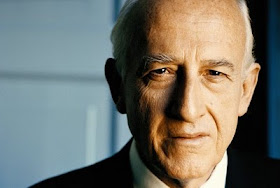 Every two years since the foundation of Ionarts, Washington Performing Arts Society has been bringing Maurizio Pollini to Washington. Last night, we were back at the Kennedy Center Concert Hall to hear his latest recital, an all-Chopin program. It has reportedly been a tough year for the legendary Milanese pianist, with an injury and some cancellations, and one had the sense watching him that the rigors of touring weighed heavily on him. One occasionally heard fatigue in the playing, too, further signs of a slight decline in Pollini's once invulnerable technique, to be expected with age. What has not faded is the clarity of structure apprehended by his mind and transmitted in the way that he plays: this may not have been perfect Chopin, but it was Chopin definitely worth hearing.
Every two years since the foundation of Ionarts, Washington Performing Arts Society has been bringing Maurizio Pollini to Washington. Last night, we were back at the Kennedy Center Concert Hall to hear his latest recital, an all-Chopin program. It has reportedly been a tough year for the legendary Milanese pianist, with an injury and some cancellations, and one had the sense watching him that the rigors of touring weighed heavily on him. One occasionally heard fatigue in the playing, too, further signs of a slight decline in Pollini's once invulnerable technique, to be expected with age. What has not faded is the clarity of structure apprehended by his mind and transmitted in the way that he plays: this may not have been perfect Chopin, but it was Chopin definitely worth hearing.Truth be told, it was a sort of odd duck program, omitting the most demanding works that were so beautifully set down for eternity in his recordings. Each half began with nocturnes, gloomy pieces with which Pollini did not seem fully in touch in his recent recording. Some of the nocturnes played here reinforced that impression, but in others his recent comments about admitting to finding his early Chopin recordings "too straight" came to mind. He had a melancholy ease of tempo with the outer sections of op. 55/1, which opened the evening, lovingly caressing each phrase and launching the triplet roulades of the ornamented return of the melody like sprays of cool water. There was a similar touch to op. 62/1, with its airy trills, by which he stretched the tempo but never to the point of fussiness. That lack of mannerism is refreshing in Chopin, which so many pianists play with too much emotion on their sleeve, and it is what made op. 62/2 so lovely, too.
The best of the first half was saved to the end, including performances of the Barcarolle (op. 60) and Berceuse (op. 57) that did not quite measure up to his recordings (but what can?). Some of the fuller right-hand structures were a little dicey in the Barcarolle, while the trills in general remained fluffy and the right hand could still launch upward on inspired arpeggiations. The same was true for the Berceuse, with all that right-hand figuration as light as a feather over the gently rocking harmonic repetition. Most strikingly, this performance of the A♭ Polonaise-fantaisie (op. 61) was more appealing than Pollini's own recording: more polonaise than fantasy, even the dreamy grace note arpeggiations of the introduction had more impetus. A lone mazurka (op. 56/3) was a little perfunctory, the dotted rhythms clotted by a slight over-application of the sustaining pedal.
Joe Banno, Pianist Maurizio Pollini at the Kennedy Center (Washington Post, May 14) |
The last piano recital in the WPAS season will be Yuja Wang (May 22, 8 pm) at the 6th and I Historic Synagogue. The good news is that we will have to wait for only one year before the next chance to hear Maurizio Pollini: he will play the last three Beethoven sonatas on March 30, 2011, in the Music Center at Strathmore.
No comments:
Post a Comment